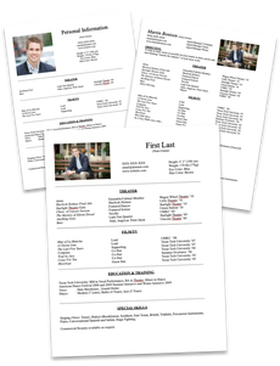|
In this guide, we'll go into depth on how to write your acting resume Special Skills section – both what to include AND mistakes to avoid so you stand out to casting directors.
Acting Resume Special Skills
|
|
Rules for Acting Resume Special Skills
When writing the Special Skills section of your resume, it's important to follow some key rules, because not doing so will make you look inexperienced or "out fo touch" to casting directors. Here are the rules you should follow:
- Do NOT lie about your skills. If you're not very good at something and don't think you'd be able to be with a little more practice, do not list it. There are stories of casting directors who hired actors for things and the actor showed up to set not having any clue how to do it (example: an actor said he was good at horseback riding... and when he showed up it turned out he had a fear of horses)! If a production has to recast last-minute, that's a HUGE and costly problem, and they'll never forget that it was your fault.
- Conversation starters can be listed in the Special Skills section IF they're unique. "Loves playing games" is too general, whereas "Dungeons & Dragons expert" might be more eye-catching to a casting director. Sure, it's not necessarily something you'd be cast for but if the casting director or agent plays Dungeons & Dragons themselves, they might just call you in because of that commonality!
- The Special Skills section of your resume must always be last. Your skills can either be formatted into categories, each category being its own line (if you need to fill up space), or you can simply list all the special skills next to each other in one big paragraph, separated by commas (this is the more common option).
- Make sure to clarify your skill level and any details required for the skill. If you can sing, what type of singing do you do? What is your voice type? If you can stage-fight, what type of training do you have? If you can juggle, how many balls? The more specific you are, the more helpful/useful casting directors will find the information.
- Put your most impressive and relevant skills first. I recommend modifying the order of your skills if a role calls for a certain skillset. For instance, if you're submitting to a role that requires you to play piano, move that up front on your list. And when submitting to more generalized productions that don't require a specific skill, just think about what the production might find interesting/helpful – are you submitting for a comedic film? If so, perhaps move "stand up comedian" or "improvisation" to the beginning of your Special Skills section.
- Be careful with accents and dialects. Some casting directors might test you in the audition, so if you're unable to conjure up the accent on demand (meaning you need lots of practice with the words ahead of time), don't list it or you could be in for some embarrassment in the audition room.
What are good special skills to put on an acting resume?
In this list, you'll find one of the most extensive lists of acting special skills examples to pick from anywhere on the internet. That being said, this list is by no means all-encapsulating because there are almost unlimited special skills to choose from:
- Stage combat: gun handling, combat training, firearms training/handling, weapons training/handling, your fitness level, any certifications you have, martial arts, fencing
- Musical instruments: accordion, autoharp, banjo, bass, bassoon, bones, bongos, cello, clarinet, conga, drums, dulcimer, fiddle, finger cymbals, flute, french horn, guitar, harmonica, harp, jazz piano, kazoo, keyboards, mandolin, maracas, marimba, oboe, organ, percussion, piano, piccolo, recorder, sax, stand up bass, synthesizer, tambourine, trombone, trumpet, tuba, ukulele, viola, violin
- Foreign languages/accents: don't forget to include your native language as a special skill because casting directors might specifically search for it
- Athletics: aerobics, archery, badminton, balloonist, baseball, basketball, baton twirling, billiards player, boating, bodybuilding, body surfing, bowling, boxing, canoeing, cheer leading, cricket, croquet, diving, drive a boat, fencing, field hockey, figure skate, fishing, fly fishing, football, frisbee, gold, gymnastics (backflips, front flips, balance beam, handstand, hand-walking, etc.), hacky-sack, handball, hang gliding, hiking, ice hockey, jump rope, double dutch jump rope, kayaker, kick boxing, lacrosse, mountain climbing, pilot a plane, ping-pong, pogo stick, racquetball, rappelling, razor scooter, rock climber, roller hockey, roller skate, rollerblade, rugby, running, scuba diving, sculling, skateboard, long board, skateboard, street, skateboard, stunts, street/trap shooting, sky diving, snorkeler, snow ski, snowboarder, snowmobile, soccer, softball, speed skating, squash, supercross, surfer, tennis, trampoline, trapeze, volleyball, water polo, water skier, weight lifter, windsurfer, wrestling, swimming (back stroke, breast stroke, butterfly, diving, freestyle, swimming, general, synchronized), track & field (broad jump, discus, high jump, hurdle, javelin, long distance, long jump, marathon, pole vault, relay, shot put, sprinter, track, general, triathlon)
- Vehicle Proficiency: driver's license (especially if you can operate stick), motorcycling, boating, piloting a plane, snowmobiling, flying a helicopter, driving trucks (commercial license), heavy machinery license
- Dancing: ballet, ballroom, belly, Bollywood, clog, club, contra, disco, flamenco, hip hop, hula, Irish, jazz, line, modern, pointe, polka, pop locking, robot, salsa, samba, square, swing, tango, tap, waltz, breakdance, choreographing
- Singing: indicate vocal range and type of singing (alto, baritone, bass, mezzo-soprano, soprano, tenor), beatboxing, rapping, body percussion, song-writing, country, folk, jazz, musical theater, opera, pop, R&B
- Crew Skills (yes, these are helpful sometimes): dressmaking, sewing, set construction, carpentry, electrical, stage management, running a light or sound board, hanging and focusing lights, rigging, gaffing, operating a fly system, scene painting, hairstyling, makeup artistry, intimacy director, directing, writing, prop making, child wrangling, animal handling, pyrotechnics, projection, video design, editing, soldering
- Administrative (yes these are also helpful sometimes): box office experience, graphic design, photography, writing press releases, licensed attorney, CPA, grant-writing, social media management
- Other: balloonist, juggling, clowning, mime, ventriloquism, puppetry, magic tricks, stand up comedy, improv comedy, rope tricks, conducting, improvisation, voiceover acting, comfortable working with animals, foley artist, understudy experience, knitting, storytelling, painting, braces (yes really – read more about acting with braces here) specialized knowledge (fitness, medical, marketing, legal, financial, translation, etc.), specialized experience (military, secret service, politics, etc.)
What NOT To List in Special Skills for Resume
From the list above, it could appear as though literally anything could go into your Special Skills section, but that would be false.
Do NOT list things like "dog lover," "avid reader," "traveler," etc., because they are to general. Lots of people could say those things and they are not necessarily useful for a production.
You should also avoid name dropping like "related to Jimmy Hendrix" or including random hobbies you're not really good at. Casting directors hate when actors use the Special Skills section of their resume as a "landfill for useless information."
Do NOT list things like "dog lover," "avid reader," "traveler," etc., because they are to general. Lots of people could say those things and they are not necessarily useful for a production.
You should also avoid name dropping like "related to Jimmy Hendrix" or including random hobbies you're not really good at. Casting directors hate when actors use the Special Skills section of their resume as a "landfill for useless information."
Use Special Skills to Your Advantage to Book More Work
Most people won't do this, but if you really want to start booking more work (especially through online casting site submissions), it's in your best interest to learn the most commonly requested special skills for productions so you can add them to your arsenal and open the door to more opportunities. This is why "triple threats" get so much work – their skills are in demand!
The most commonly requested skills include:
Each of those could take years to learn so the sooner you start, the better!
But here's something most people don't talk about: Do NOT try to guess at what you think casting directors want in general.
Instead of simply working on all the skills listed above, you should first focus on where you want your career to be 3-5 years from now. Do you want to be performing on Broadway? Do you want to be doing comedic films?
Think about what you want and work backwards. Which skills would be most beneficial for getting more work in that area?
For instance, if you want to act in Disney films, they often need actors who can play sports, sing, and dance. If you want to focus on comedy, they often hire actors who can do stand up and improv. On the other hand, if your goals include performing on Broadway, dancing and singing are a must.
By focusing your energy on attention on just the few skills you need, you can avoid becoming a jack of all trades and master of none (which won't help you). Start spending time developing those specific skills now and you'll be perfectly positioned a few years to start getting TONS of work in whichever area you most want.
The most commonly requested skills include:
- Accents (here are some commonly requested accents)
- Stage combat and gun handling
- Musical instruments (most commonly piano, guitar, and violin)
- Dancing and singing
- Stand up and improv
Each of those could take years to learn so the sooner you start, the better!
But here's something most people don't talk about: Do NOT try to guess at what you think casting directors want in general.
Instead of simply working on all the skills listed above, you should first focus on where you want your career to be 3-5 years from now. Do you want to be performing on Broadway? Do you want to be doing comedic films?
Think about what you want and work backwards. Which skills would be most beneficial for getting more work in that area?
For instance, if you want to act in Disney films, they often need actors who can play sports, sing, and dance. If you want to focus on comedy, they often hire actors who can do stand up and improv. On the other hand, if your goals include performing on Broadway, dancing and singing are a must.
By focusing your energy on attention on just the few skills you need, you can avoid becoming a jack of all trades and master of none (which won't help you). Start spending time developing those specific skills now and you'll be perfectly positioned a few years to start getting TONS of work in whichever area you most want.
WANT A TALENT AGENT TO GROW YOUR CAREER?
Knowing how to put together an effective resume is important, but it's just one small part of growing your acting career.
If you want to act full-time, your first major goal should be to get a legitimate, hardworking talent agent.
I highly recommend checking out this short podcast episode, where I share:
Listen in using the player below, and be sure to hit Subscribe (you can listen in on Spotify, Apple Podcasts, and more).
If you want to act full-time, your first major goal should be to get a legitimate, hardworking talent agent.
I highly recommend checking out this short podcast episode, where I share:
- The exact steps to getting a great, hardworking, and legitimate talent agent.
- How to shortcut the process significantly, especially for new actors.
- Tips to avoid scammers in the industry (there are a lot of them!)
Listen in using the player below, and be sure to hit Subscribe (you can listen in on Spotify, Apple Podcasts, and more).
|
Martin Bentsen (author of this guide) is an actor marketing coach who uses strategic thinking to help actors book more work. He’s helped over 14,000 actors with their careers and actor headshots since 2009 and his photography studio City Headshots is ranked #1 on Yelp. He’s spoken at NYU, The New England Theater Conference, The Actor’s Green Room, and other venues. Want to book more acting work by thinking strategically? Start with his free Actor’s Toolkit to create new opportunities right away, or visit his website at www.martinbentsen.com. |
Further Reading:
If you enjoyed this article, you'll probably enjoy these:
Comments are closed.



